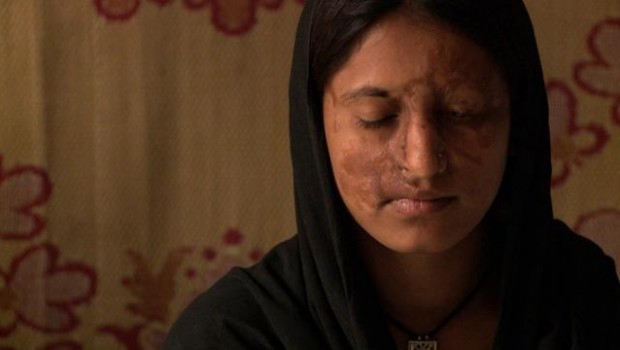
In continuation of Mirroring Reality: A Conversation with Sabiha Sumar – Part 1
Sabiha Sumar presents the harsh reality of women’s lives in a poignant film ‘Saving Face’ – a documentary about survivors of acid-attacks in rural Pakistan. This time wearing the producer’s hat, she explained, ‘Acid throwing is both an urban and rural phenomenon. It is a common problem here due to the fact that acid is freely available in the market in a society where adequate measures have not been taken to protect women from recurring violence. The film follows Dr. Mohammad Ali Jawad, a plastic surgeon based in London, who makes frequent trips to his home country Pakistan in order to perform surgeries free of cost for women who were affected by acid violence.’
The film chronicles the lives of Zakia and Rukhsana as they attempt to bring their assailants to justice and move on with their lives. These women have had to deal with extreme levels of trauma, and immense physical discomfort. Undoubtedly, it was a challenge for Sumar to convince the women, and even one of the perpetrators, to speak in front of the camera. ‘One of the hardest parts was when I had to speak to Zakia’s husband, Pervez, who at that time was facing trial in the anti-terrorist court. The way he communicated was very indicative of his defiance and self-righteousness, which was upsetting to witness. It was almost as if he thought women deserved such treatment’, said Sumar.
Winning the very first Oscar for Pakistan, ‘Saving Face’ was able to bring out not just the plight, but also the strength of these women, to an international audience. Even though the women in the film did not allow it to release in Pakistan, Sumar believes that the film did give something back to them – ‘Being part of the film and telling her story to other people has helped broaden Zakia’s whole perspective. She was able to feel for thousands of other women who were going through this violent and tragic ordeal. And, in the course of filming, she became aware that by being a part of this project, she was sending a strong message to them.’
Sumar added, ‘It is very worrying to watch that it is only women like Sarkar Abbas and Marvi Memon who are fighting for these causes on the ground. Acid violence against women is a human rights issue, and so it says a lot about a society when even the fight for justice for women is left to women. A lot more has to be done regarding the prevention of violence against women, not just in terms of deciding on punishments. Even with so many women lawyers in our court rooms today this has been an uphill task to get justice, as many cases never see a court room. Abuse is very commonly accepted as part of women’s lives and this is very worrying.’
The film, ‘Saving Face’, is also important because it took the voice of the marginalized to the mainstream audience. ‘If the images we see constantly on screen are ones we cannot recognize or relate to, they offer no hope.’ Sabiha said, ‘I think it’s very important to let cinema express this hope to us in different ways, as art helps us to look into the future and reinvent ourselves.’
Regarding the lack of women’s stories in media, she said, ‘this is a problem across the world, not just in India or Pakistan. And we can change this by creating lobbies, pressure groups, being able to raise more funding, supporting other women, and forming organizations that will fight for this.’ But what happens when broadcasters think your film has a niche audience and will not make money in the market? ‘When I started a traveling cinema for Khamosh Pani, it was to prove to myself that my film has a mass appeal. I was successful when I saw that the film touched the hearts and minds of people all across Pakistan, in rural as well as urban areas, and generated a dialogue that can bring about change. The broadcasters make decisions just because they have the power to do it, not because they base them on the demands of the audience.’ ‘Khamosh Pani’ went on to create history, as it was the first Pakistani film to be released theatrically worldwide. It also broke the 35-year-old silence between India and Pakistan when it was released in Indian cinemas.
Having established a large and varied audience for her work over the years, Sabiha is clear about her responsibilities towards them. For her global viewers, she aims to present stories and characters that will make them think and re-question the images and value judgments that are conventionally portrayed by the media as the idea of Pakistan. She said, ‘Films, for me, equal empathy – for a different world, and a different culture. If my film can make you think of the other and understand their world – be it poor women, or terrorists, or soldiers, or politicians, or the disenfranchised – if you can create a union with them, and extend your comfort zone – that change is phenomenal.’
When it comes to Pakistan, Sumar wants her films to promote pluralism, tolerance and democratization. She sees her films made over the last 20 years to be a mirror accurately representing the history of Pakistani society during this time. And she encourages her fellow citizens to use this mirror aggressively – to evaluate, critique, and to change.
For cultures across the world, including Pakistan and India, a mirror of this nature can play a crucial role in changing attitudes towards women. Cultures evolve and stereotypes break when people are exposed to counter images. Even though she makes it look like one, for a woman in Pakistan, to stand up and be heard, with a camera in her hand, creating images that entertain, inform and inspire, is certainly not an easy task.